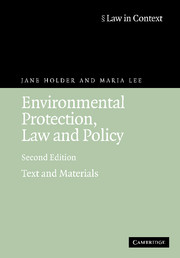Book contents
- Frontmatter
- Contents
- Table of EU legislation
- Table of international conventions
- Table of legislation
- Table of cases
- Acknowledgements
- Preface
- Part I Introduction: Law in Context
- Part II The EU Context
- Part III The International Context
- Part IV Mechanisms of Regulation I: Pollution Control
- Part V Mechanisms of Regulation II: Controls Over Land Use and Development
- Index
Part I - Introduction: Law in Context
Published online by Cambridge University Press: 05 June 2012
- Frontmatter
- Contents
- Table of EU legislation
- Table of international conventions
- Table of legislation
- Table of cases
- Acknowledgements
- Preface
- Part I Introduction: Law in Context
- Part II The EU Context
- Part III The International Context
- Part IV Mechanisms of Regulation I: Pollution Control
- Part V Mechanisms of Regulation II: Controls Over Land Use and Development
- Index
Summary
As we explained in the preface to this book, environmental law demands that we engage with the context within which the law is developed. In this Part, we locate modern environmental law within contemporary discourses about the environment, and begin to identify the boundaries and contours of the subject. In Chapter 1, we emphasise that the subject matter and content of environmental law has traditionally been set by a scientific agenda – what we refer to as the ‘scientific paradigm’. We also discuss the prospects for a change in direction in environmental law, away from scientism, in order to embrace more wide-ranging values and concerns, including various ethical positions and philosophies about the relationship between humans and nature. This is a slightly unusual starting point for a book primarily, though not entirely, about environmental law. However, our teaching of the subject for many years has convinced us that a contextual and critical approach to studying this field of law cannot be sustained without questioning the dominance of a scientific approach, for example by considering different and opposing visions of human/ nature relations. In addition, various tenets of ecological thinking are slowly influencing mainstream environmental law, leading us to ask about the prospect of this body of law shifting in a more radical direction. One important aspect of this is the now accepted need to broaden significantly and enhance ‘real’ public participation in environmental decision making, an issue taken up in Chapter 3.
- Type
- Chapter
- Information
- Environmental Protection, Law and PolicyText and Materials, pp. 1 - 8Publisher: Cambridge University PressPrint publication year: 2007

